
MOLECULAR PHARMACOLOGY
Scope & Guideline
Illuminating the Pathways of Drug Mechanisms
Introduction
Aims and Scopes
- Pharmacological Mechanisms:
Research exploring the molecular mechanisms of drug action, including receptor interactions, signaling pathways, and pharmacodynamics, is central to the journal's scope. - Disease Mechanisms:
Papers that investigate the molecular basis of diseases, particularly cancer, cardiovascular disorders, and neurodegenerative diseases, contribute to understanding how pharmacological interventions can be optimized. - Therapeutic Innovations:
The journal emphasizes innovative therapeutic strategies and drug development, including the use of natural products, nanomedicine, and novel pharmacological agents. - Translational Research:
A significant focus on translational research that bridges laboratory findings with clinical applications, aiming to enhance therapeutic outcomes in various diseases. - Interdisciplinary Approaches:
Encouragement of interdisciplinary research that integrates molecular biology, pharmacology, and clinical medicine to tackle complex health issues.
Trending and Emerging
- Cancer Pharmacology:
An increased focus on cancer pharmacology, particularly studies involving targeted therapies, immunotherapies, and the molecular mechanisms underlying tumor progression and resistance. - Neuropharmacology:
Growing interest in neuropharmacology, with research exploring the molecular underpinnings of neurodegenerative diseases and the potential of novel neuroprotective agents. - Natural Products and Herbal Medicine:
A resurgence in the exploration of natural products as therapeutic agents, emphasizing their molecular mechanisms and potential in modern pharmacotherapy. - Nanomedicine:
Emerging studies focusing on nanocarriers and nanotechnology applications in drug delivery systems, highlighting their role in enhancing drug efficacy and targeting. - MicroRNA and Epigenetics:
A trend towards understanding the roles of microRNAs and epigenetic modifications in disease processes and their potential as therapeutic targets.
Declining or Waning
- Traditional Pharmacology:
There appears to be a waning emphasis on traditional pharmacological studies, particularly those focusing solely on classical drug action mechanisms without integrating modern molecular insights. - Single-agent Studies:
Research centered around single-agent therapies is declining, as there is a growing trend towards combination therapies and polypharmacology. - Animal Models:
Papers relying heavily on animal models without translational relevance are becoming less common, reflecting a shift towards more human-relevant research methodologies. - Basic Biochemical Studies:
While foundational studies remain important, there is a noticeable decrease in purely biochemical investigations that do not connect to broader physiological or clinical implications. - Focus on Non-Cancer Diseases:
Areas related to non-cancer diseases, although still relevant, have seen less representation compared to the overwhelming focus on oncology-related pharmacology.
Similar Journals

CANADIAN JOURNAL OF PHYSIOLOGY AND PHARMACOLOGY
Championing High-Quality Research Since 1964Canadian Journal of Physiology and Pharmacology, published by Canadian Science Publishing, is a leading peer-reviewed journal dedicated to advancing knowledge in the fields of physiology and pharmacology. With an ISSN of 0008-4212 and an E-ISSN of 1205-7541, this journal has been at the forefront of biomedical research since its inception in 1964. The journal operates within a constrained access model, ensuring a selective dissemination of high-quality research, while maintaining its esteemed position in the Q3 quartile across multiple relevant categories such as Medicine, Pharmacology, and Physiology as of 2023. Researchers, professionals, and students alike will find the journal a valuable resource for emerging trends and comprehensive studies that shape contemporary science, as evidenced by its competitive Scopus rankings. The Canadian Journal of Physiology and Pharmacology is vital for fostering scholarly dialogue and innovation in the scientific community, encouraging contributions that promote a deeper understanding of physiological and pharmacological phenomena.
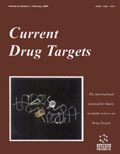
CURRENT DRUG TARGETS
Connecting Researchers to the Future of MedicineCURRENT DRUG TARGETS is a leading peer-reviewed journal dedicated to advancements in the fields of Clinical Biochemistry, Drug Discovery, Molecular Medicine, and Pharmacology. Published by Bentham Science Publishers Ltd, this esteemed journal has solidified its position in the academic community with a 2023 Q2 ranking in several categories, highlighting its influence and relevance in drug research and development. With an ISSN of 1389-4501 and E-ISSN 1873-5592, CURRENT DRUG TARGETS facilitates the dissemination of high-quality articles that explore novel therapeutic strategies and drug design principles. Catered to researchers, professionals, and students, the journal has a commitment to advancing knowledge while addressing contemporary challenges in pharmacological sciences. As it converges from 2000 to 2024, CURRENT DRUG TARGETS remains a vital resource in understanding the complexities of drug action and interaction, making it indispensable for anyone pursuing cutting-edge research in related disciplines.

NAUNYN-SCHMIEDEBERGS ARCHIVES OF PHARMACOLOGY
Pioneering Research in Pharmacology Since 1969NAUNYN-SCHMIEDEBERGS ARCHIVES OF PHARMACOLOGY is a prestigious journal published by SPRINGER, focusing on the dynamic fields of pharmacology and toxicology. With an ISSN of 0028-1298 and an E-ISSN of 1432-1912, this esteemed publication has been a staple in the scientific community since its inception in 1969, continuing to wield influence with a convergence of research that reaches through 2024. Ranked in the Q2 category for both medicine and pharmacology, it stands at an impressive 111th out of 313 in the Scopus rankings for pharmacology, reflecting its significant impact in the field. Though not offering open access, the journal remains a vital resource for researchers, professionals, and students seeking to explore groundbreaking studies and advancements in pharmacological science. With its high standards and comprehensive coverage, NAUNYN-SCHMIEDEBERGS ARCHIVES OF PHARMACOLOGY is essential reading for those dedicated to understanding the mechanisms of drug action and the complexities of therapeutic interventions.
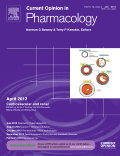
CURRENT OPINION IN PHARMACOLOGY
Navigating the Complexities of Drug DevelopmentCurrent Opinion in Pharmacology, an esteemed journal published by Elsevier Science Ltd, encompasses the vital field of pharmacology and drug discovery. With a solid impact factor and recognized as a Q1 journal in both Drug Discovery and Pharmacology categories for 2023, it serves as a premier platform for researchers and professionals to share innovative insights, discuss emerging trends, and explore the complexities of drug development and therapeutic applications. Established in 2001 and running through 2024, this journal provides a critical overview of advances in the field, aiming to inform and inspire the next generation of pharmacological research. Despite lacking Open Access options, it maintains a high standard of scholarly excellence, ensuring that the content remains impactful and relevant to its readers. The journal is based in the Netherlands, representing a key contributor to the academic landscape in pharmacology.

Physiology and Pharmacology
Advancing knowledge in physiology and pharmacology.Physiology and Pharmacology is a distinguished open access journal that has been disseminating high-quality research in the fields of physiology and pharmacology since its inception in 1997. Published by the Iranian Society of Physiology & Pharmacology, this journal offers a platform for scholars and practitioners to share innovative findings and advancements that contribute to the understanding of biological systems and drug action. With its ISSN 2476-5236 and E-ISSN 2476-5244, it ensures global reach and accessibility. The journal is positioned in the third quartile for Linguistics and Language and fourth quartile in both Pharmacology and Physiology categories according to Scopus rankings, reflecting a commitment to expanding knowledge within these interdisciplinary domains. Set within the academic landscape of Iran, the journal aims to bridge regional research with the international community, providing valuable insights into physiological processes and pharmacological developments. In light of its open access model, the Physiology and Pharmacology journal plays a crucial role in enhancing the visibility of research outcomes and fostering collaboration among researchers, professionals, and students on a global scale.
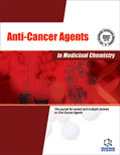
Anti-Cancer Agents in Medicinal Chemistry
Exploring the intersection of chemistry and cancer research.Anti-Cancer Agents in Medicinal Chemistry is a pivotal journal in the realm of cancer research, published by Bentham Science Publishers in the United Arab Emirates. With an ISSN of 1871-5206 and an E-ISSN of 1875-5992, this esteemed journal has been disseminating high-quality research since its inception in 2006, and is set to continue through 2024. The journal is categorized in the third quartile (Q3) across key areas including Cancer Research, Molecular Medicine, and Pharmacology, highlighting its essential role in providing valuable insights to the scientific community. Despite its open-access status being unspecified, researchers benefit from the rigorous peer-review process ensuring the publication of significant advancements. The journal ranks well within Scopus, particularly in the fields of Pharmacology and Cancer Research, which positions it as a notable resource for professionals, students, and researchers aiming to deepen their knowledge in anti-cancer strategies. Through its comprehensive scope, the journal aims to bridge the gap between medicinal chemistry and clinical applications, making it an indispensable tool for those dedicated to advancing cancer therapeutics.
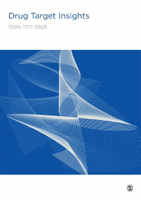
Drug Target Insights
Connecting Researchers to Transformative Drug Insights.Drug Target Insights is a prestigious peer-reviewed journal published by ABOUTSCIENCE SRL, catering to the dynamic field of pharmacology and medicinal biochemistry. With an Open Access policy since 2006, the journal aims to promote the dissemination of cutting-edge research and innovations that target drug discovery and therapeutic developments. Based in Milan, Italy, it boasts a notable impact within its research community, achieving a Q3 classification in the categories of Clinical Biochemistry and Medical Pharmacology in 2023, alongside a robust performance in the Q2 category for Pharmacology, Toxicology, and Pharmaceutics. The journal serves as a vital platform for researchers, professionals, and students seeking to advance their understanding of drug delivery systems, therapeutic targets, and pharmacodynamics. With a commitment to enhancing global access to crucial research findings, Drug Target Insights stands out as an essential resource for those engaged in the ever-evolving landscape of pharmaceutical sciences.
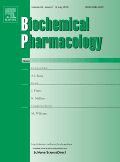
BIOCHEMICAL PHARMACOLOGY
Exploring the synergy between biochemistry and therapeutics.BIOCHEMICAL PHARMACOLOGY, published by PERGAMON-ELSEVIER SCIENCE LTD, stands as a leading international journal devoted to the advancing field of biochemical pharmacology. Since its inception in 1958, the journal has continuously offered a platform for innovative research, delivering critical insights into the interaction between biochemical processes and pharmaceutical applications, and now converges towards its 2024 edition. With an impressive Q1 ranking in both Biochemistry and Pharmacology categories, it ranks 32nd out of 313 in Pharmacology and Toxicology, and 58th out of 438 in Biochemistry according to Scopus, showcasing its significant impact within the scientific community. Researchers and professionals rely on this journal to keep abreast of essential developments, given its robust peer-review process and a comprehensive selection of articles that span experimental studies, clinical trials, and theoretical analyses. Although not an Open Access journal, it remains pivotal for those seeking to advance their knowledge in the dynamic fields of biochemistry and pharmacology. With its high impact factor and emphasis on quality research, BIOCHEMICAL PHARMACOLOGY continues to be an invaluable resource for students, researchers, and industry professionals striving to make breakthroughs in drug development and therapeutic strategies.
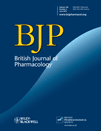
BRITISH JOURNAL OF PHARMACOLOGY
Pioneering insights into drug mechanisms and therapeutic innovations.British Journal of Pharmacology is a premier, peer-reviewed journal published by Wiley, specializing in the dynamic field of pharmacology. With a robust impact factor, this journal ranks in the top quartile (Q1) for pharmacology according to the 2023 category rankings, emphasizing its significance and reputation among the global scientific community. As an essential resource for researchers, professionals, and students alike, the journal provides a platform for innovative research spanning foundational studies to clinical applications in pharmacology, toxicology, and pharmaceutics. Since its inception in 1966, the journal has consistently contributed to the advancement of pharmacological science, fostering a deeper understanding of drug action mechanisms and therapeutic advancements. Although primarily subscription-based, the British Journal of Pharmacology is committed to disseminating high-quality research that shapes the future of the field.
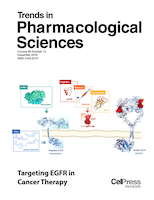
TRENDS IN PHARMACOLOGICAL SCIENCES
Unveiling Cutting-Edge Trends in Pharmacological ResearchTRENDS IN PHARMACOLOGICAL SCIENCES, an esteemed journal published by CELL PRESS, is a leading platform in the field of pharmacology and toxicology, with an impressive history since its inception in 1979. With an impact factor that places it in the top quartile category (Q1) for both pharmacology and toxicology as of 2023, it is recognized for disseminating high-quality, peer-reviewed research that shapes the future of these disciplines. The journal is indexed with a robust standing in Scopus rankings, positioned at rank #2 in Toxicology and #6 in Pharmacology, both boasting an extraordinary percentile of 98. Researchers, professionals, and students benefit from its comprehensive coverage, which spans cutting-edge advancements, review articles, and significant trends in drug development and toxicity assessment. While the journal does not currently offer open access options, it remains a vital resource for the academic community, ensuring critical insights into the complexities of pharmacological sciences are readily available to enhance research and practice.